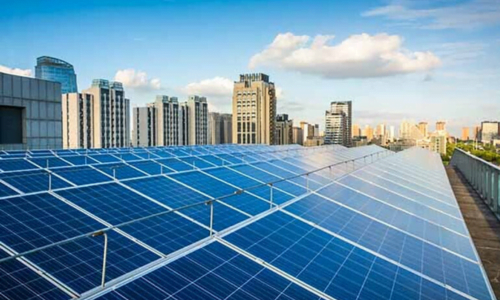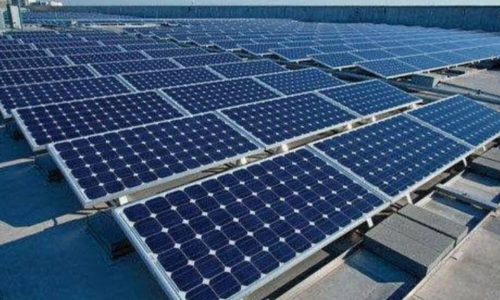Hybrid Agriculture Solar Systems
Hybrid Solar Power System with Integrated Battery Backup for Agriculture

A Hybrid Agriculture & Farm Solar System combines conventional farming techniques with renewable solar energy solutions. These systems provide power for irrigation, lighting, and other farm machinery while reducing dependency on the grid or fossil fuels. In a hybrid system, solar panels generate electricity, which can be used immediately or stored in batteries for later use. Additionally, these systems are often designed to work alongside traditional generators, ensuring continuous power supply in the absence of sunlight.
As the global population continues to rise, the demand for food and energy will only increase. Hybrid solar systems provide a sustainable solution to this growing demand. These systems not only help farmers increase their productivity but also promote environmentally friendly practices that reduce the impact of farming on climate change.
With advancements in solar technology, hybrid systems are becoming more affordable and efficient, making them an attractive investment for farms of all sizes. Governments and environmental agencies are also encouraging the adoption of solar power in agriculture through various incentives, making this the ideal time for farmers to explore the benefits of hybrid solar systems.

Key Components of Hybrid Solar Systems for Farms
Solar Panels
The heart of the system, solar panels capture sunlight and convert it into electricity. For farms, these panels are typically installed in open spaces such as rooftops of barns or on the land itself.
Inverters
With both battery and grid serving as backups, it guarantees a more reliable power supply.
Battery Storage
Batteries store excess solar energy generated during the day, allowing the farm to operate at night or during cloudy weather when solar power is unavailable.
Generators
In a hybrid setup, traditional generators are integrated to serve as backup power sources during long periods of low sunlight or high energy demand.
Control Systems
Advanced control systems manage the flow of power between solar panels, batteries, and backup generators to ensure optimal energy use.”
Benefits of Hybrid Solar Systems for Agriculture
Energy Independence
By using solar power, farmers can reduce their reliance on grid electricity or fossil fuels. This not only lowers operational costs but also shields the farm from fluctuating energy prices.
Reduced Operational Costs
Solar power is a free resource, and once the system is installed, the farm can enjoy lower electricity bills, especially in remote locations where connecting to the grid is expensive.
Environmental Benefits
Solar energy is a clean and renewable source of power, reducing the farm’s carbon footprint. This contributes to a greener, more sustainable farming practice.
Irrigation Support
Hybrid systems are often used to power irrigation systems. This ensures a consistent water supply to crops, even in areas where grid power is unreliable or unavailable.
Resilience Against Power Outages
he backup generator and battery storage ensure that the farm’s critical operations, such as irrigation, lighting, and cold storage, are not interrupted even during grid failures.
Energy Storage
The ability to store excess energy in batteries ensures that the farm has access to power during non-sunlight hours, creating a reliable energy supply year-round.

Key Components of Hybrid Solar Systems for Farms
Irrigation
Solar-powered pumps can draw water from wells, rivers, or reservoirs to irrigate crops. Hybrid systems ensure that even in cloudy conditions, there’s a backup power source to maintain consistent irrigation.
Cold Storage
Fresh produce often needs to be stored at specific temperatures to prevent spoilage. Solar energy can power cold storage facilities, ensuring that fruits, vegetables, and other perishable items are preserved.
Farm Machinery
Hybrid systems can be used to power various types of farm equipment such as electric tractors, water pumps, and other mechanical tools, reducing the reliance on fuel-driven machinery.
Greenhouses
Hybrid solar systems can power the heating, cooling, and lighting required in greenhouse farming, creating an ideal environment for growing crops throughout the year.
Lighting
Farms need lighting for various operations, especially during early mornings or late evenings. Solar-powered lighting systems ensure continuous illumination without increasing electricity costs.
Essential Considerations for Farmers Adopting Hybrid Solar Systems
Initial Investment
While the long-term benefits of hybrid solar systems are substantial, the initial cost of installation can be high. However, government subsidies and loans are often available to reduce the financial burden.
System Maintenance
Regular maintenance is essential to ensure the solar panels and batteries work efficiently. Cleaning panels, checking wiring, and monitoring energy output should be part of the routine.
Location
The effectiveness of solar power depends on the location of the farm. Farms in areas with abundant sunlight will benefit more than those in regions with frequent cloud cover. However, the hybrid nature ensures that backup power is available when solar energy is insufficient.
System Design
t’s essential to design the system according to the farm’s specific needs. For example, a small farm may only require a basic solar setup, while larger farms may need a more advanced hybrid system with a significant battery capacity and generator backup.
Further Factors to Contemplate Regarding Solar Power Systems

The type of solar power system you choose for your home is undoubtedly a crucial decision, but in addition to that, there are other factors to consider, including:
Solar Power System Size: The size of the solar power system you opt to install in your home is contingent upon your energy needs, as well as whether you intend to incorporate battery storage or generate electricity independently. Factors such as your power consumption habits and the amount of sunlight available for generation will influence the ideal system size.
Solar Panel Placement: While solar panels are typically installed on the rooftops of homes, there are instances where ground-mounted posts may be utilized. This scenario arises when the roof is aged, has an unconventional slope, or lacks adequate sunlight exposure.
Fixed vs. Sun Tracking Arrays: Solar arrays come in two varieties: fixed and sun tracking. Fixed arrays are the more prevalent option, being both cost-effective and straightforward to design and install. On the other hand, sun tracking arrays are employed to maximize solar power generation. By dynamically adjusting the angle of solar panels, sun tracking arrays ensure optimal exposure to sunlight, thereby increasing energy yield.
Solar Panel Material: Solar panels come in various materials, including crystalline silicon, monocrystalline, polycrystalline, and thin film. Solar installers possess the expertise to recommend the most suitable material for your solar power needs.
Solar Power System Financing: While some homeowners can afford to purchase a solar power system outright, others may require financial assistance. Loans are readily available for this purpose. Another viable option is leasing, which allows homeowners to enjoy the savings and financial incentives of solar power without the burden of upfront costs.
Other Types Agriculture Solar Systems
At Synergy Solar, we offer a variety of customizable solar solutions tailored to meet the unique energy demands of agricultural operations. Our systems are designed to help farmers reduce energy costs, increase sustainability, and ensure a reliable power supply for all essential farm activities.
On-Grid Solar Systems
On-Grid Solar Systems are perfect for farms with significant energy needs that want to reduce their electricity bills while remaining connected to the main power grid. These systems enable farmers to offset their energy consumption by using solar power and export any excess energy back to the grid for potential credits, maximizing efficiency.
Benefits:
- Lower Energy Costs: Save on electricity bills by utilizing solar energy for daily operations.
- Net Metering: Export surplus energy back to the grid and earn credits, reducing overall energy expenses.
- Low Maintenance: Seamlessly integrates with your existing electrical systems and requires minimal upkeep.
Off-Grid Solar Systems
Off-Grid Solar Systems are ideal for agricultural operations in remote areas where grid access is limited or unreliable. These systems offer complete energy independence, providing a reliable and continuous power supply with the help of battery storage. Even during power outages or periods of low sunlight, your farm will continue running smoothly.
Benefits:
- Energy Independence: Achieve full autonomy from the grid, ensuring a steady and reliable power supply for critical farming equipment and operations.
- Tailored Solutions: Each system is designed to meet the specific energy needs of your farm, whether for irrigation, refrigeration, or general operations.


